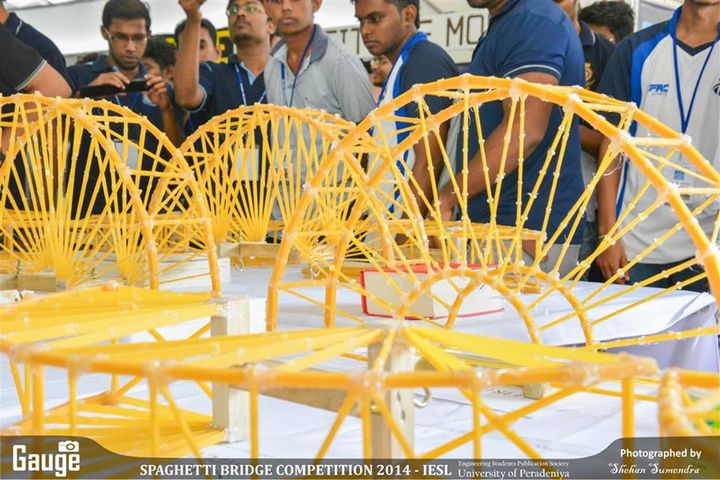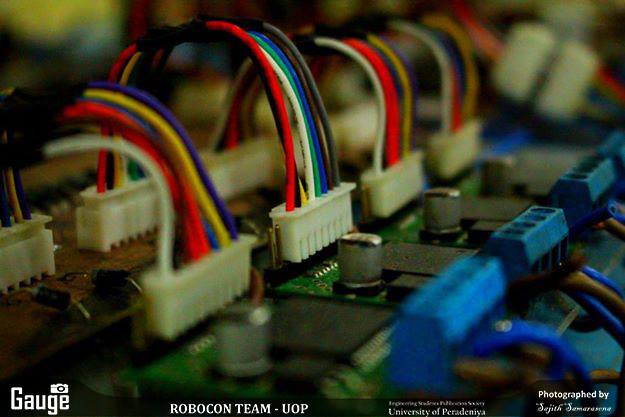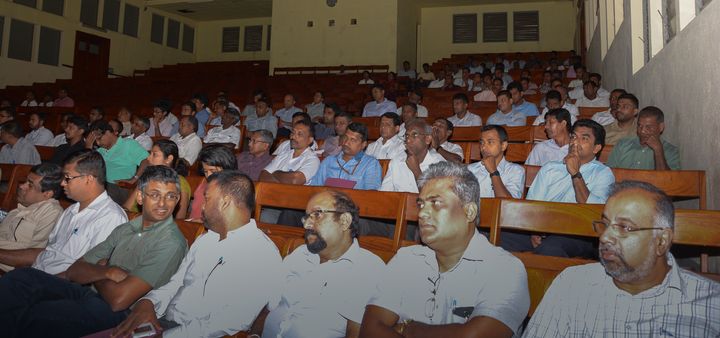ESCAL: Pioneering the Future of Computer Engineering at Peradeniya

The University of Peradeniya is the oldest and most highly acclaimed university in Sri Lanka. The Faculty of Engineering is one of the faculties which engages in extensive research while training highly qualified engineers. To add more value to the Faculty, the Department of Computer Engineering had formed a group and built a lab for students to engage in research and development activities in Computer Architecture and Embedded systems. This is introduced as “ESCAL (Embedded Systems and Computer Architecture Laboratory) - one of the greatest research and development centres in Sri Lanka, at the University of Peradeniya.
The ESCAL group has been in effect for over 15 years at the University of Peradeniya with the aim of enhancing our country's capacity to produce engineering graduates equipped with advanced knowledge in upcoming tech and computer architecture-related advancements. Since its establishment over 15 years ago, the ESCAL group at the University of Peradeniya has remained committed to fostering the development of our country by nurturing engineering graduates with in-depth expertise in emerging technologies and computer architecture-related advancements.
The group's inception can be traced back to a defining moment in October 2006, when a passionate PhD graduate named Roshan Ragel, brimming with dreams, dedication, and enthusiasm, embarked on a journey. This individual, one of the three lecturers in the Department of Computer Engineering at the time, was determined to provide unparalleled service to the Department, Faculty, University, and the entire nation. Fueled by unwavering confidence, the goal of delivering excellence was at the core of his mission.
He was travelling through the A9 route by bus from Kandy on a Saturday morning. The traveller had just finished his PhD in Sydney and was full of dreams, dedication, incredibly high expectations, and enthusiasm. That morning, his mind was focused on research and publications. He thought of establishing a lab that would be distinctively recognised as the only one of its calibre in Sri Lanka. It would also assist in moulding the department's students into specialists. His best decision was to concentrate on the systems element of computer engineering and establish a specialised laboratory dedicated to conducting research and development projects focused on systems, specifically Embedded Systems, as he is a graduate of the same Department and is familiar with the atmosphere, its vision, and aspirations.
As an initiative, he began writing several acronym permutations and combinations on paper while riding on the bus. He was looking for a unique name that represented expansion and had significance for the targeted area. After substantial thoughts and thousands of trials and errors, he decided on the acronym “ESCAL”, which stands for Embedded Systems and Computer Architecture Laboratory, which also depicts the meaning “escalate, escalator, or other words with ascending connotations”.
The ESCAL group, with its rich history and remarkable accomplishments, continues to make ground-breaking strides in research and development. Its primary focus lies in the micro-architectural design aspects of embedded microprocessors, with a keen emphasis on addressing security and reliability concerns. Moreover, the ESCAL group's pioneering efforts extend beyond the realm of micro-architectural design in embedded microprocessors. They actively explore cutting-edge research avenues related to Cyber-Physical systems, fostering advancements in various domains such as side-channel attacks and countermeasures, application-specific CPU and memory hierarchy design, robotics, hardware acceleration, and high-performance computing. They further expanded into application areas such as robotics, biomedical engineering, and computational biology, where systems research can help.
By delving into these critical areas, the ESCAL group not only expands the boundaries of knowledge but also contributes to practical applications and solutions that have the potential to shape industries and drive technological progress. Their dedication to advancing the field ensures that they remain at the forefront of innovation, making significant contributions to the ever-evolving landscape of computer engineering and its impact on society.
Prof. Roshan Ragel, the present Head of the Department of Computer Engineering, leads the group with support from Dr. Isuru Nawinne. The group consists of the academic staff members of the Department of Computer Engineering, the Postgraduate (PhD, M.Phil., M.Eng., and M.Sc.) students from both the Faculty of Engineering and the Postgraduate Institute of Science (PGIS), and the Undergraduate students from the Department of Computer Engineering and the Department of Statistics and Computer Science. The group also collaborates with academic staff members, postdoctoral researchers and postgraduate students from the School of Computer Science and Engineering, UNSW. Prof. Roshan Ragel regularly visits UNSW, Sydney, as a visiting research fellow and Queensland University of Technology (QUT), Brisbane.
At present, the group works on the following themes:
- Embedded and Cyber -Physical Systems Design
- Security and Reliability of Embedded Systems
- Side-Channel Attacks and Countermeasures
- Application-Specific CPU and Memory Hierarchy Design
- FPGA and GPU based acceleration
- High-Performance Computing
- Biomedical Engineering
- Intelligent Robotics
While concentrating on research projects, the ESCAL group made some better changes, which will indefinitely help undergraduate students shine worldwide even in the future. One of those developments is the ESCAL Makerspace, which was solemnly built for students interested in innovations.
The ESCAL Makerspace, too, has its own history. Computer Engineering students at Peradeniya must design and develop cyber-physical systems and embedded systems-based tech products as part of the core curriculum. In these projects, they build hardware and network, security, and software components. Being closely guided by the academic staff, some students go above and beyond the requirements of the course to take their projects to even higher standards.
Since the inception of the cyber physical systems design project course, one of the main obstacles hindering undergraduates from creating innovative solutions for several years was the absence of current design and production tools necessary to build high-quality components and items effectively. Dr Isuru Nawinne, who himself was a former student in ESCAL, and the mind behind the Cyber-Physical Systems Design project course, stepped up and proposed a creation of a fully functional Makerspace with funding secured from the University as well as external collaborations. Dr Nawinne, who firmly believes in project-based experiential learning, planned this laboratory as a place where students could walk in and use their creativity and curiosity to engage in practical engineering projects.
Aligned with Dr Nawinne's vision of project-based experiential learning, establishing of ESCAL MakerSpace was a crucial step towards fostering an environment where students could unleash their creativity and curiosity. Under this vision, Mr Nuwan Jaliyagoda from the E15 class of Computer Engineering embarked on developing the Makerspace in August 2020. Phase one was successfully finished in August 2022 after the necessary space and resources were secured in late 2021.
With dedication and tireless efforts, Makerspace has become a reality, providing a space where students can come together, explore their ideas, and engage in hands-on engineering projects. This transformative initiative empowers students to apply their theoretical knowledge and nurtures a culture of innovation and entrepreneurship, ultimately preparing them to thrive in the practical world of engineering. The Makerspace is also structured so that students can easily work on different stations and subdivided areas based on the requirements of their projects. As Dr Isuru Nawinne predicted, the students are now showing more enthusiasm and dedication in building items with new ideas and creativity, making our students shine worldwide. This is one of the most significant improvements at the University of Peradeniya, especially in the Faculty of Engineering.
Another important inclusion within ESCAL is the NVIDIA GPU Research Centre at the University of Peradeniya. The primary focus of this research centre is investigating the High-Performance (and Accelerated) Computing (HPC) aspect of GPU in various domains, including bio-computing, computer security, machine learning and data mining, and physics. To this end, ESCAL is in possession of several high-performance and mobile GPU computing resources including NVIDIA RTX A6000, Kepler, Tesla and portable Jetson platforms.
ESCAL also contains extensive expertise and resources on FPGA based prototyping and acceleration. The lab is well equipped with Intel Altera Stratix V, Cyclone and AMD Xilinx Vertex FPGA resources for undergraduate and postgraduate students to conduct cutting edge research with.
The Cambio wearable computing laboratory is another important segment within ESCAL, which was setup in partnership with Cambio Software Engineering. Through this partnership, the lab has acquired modern equipment for capturing biometrics such as EEG, ECG and EMG signals for biomedical applications. ESCAL researchers conduct highly acclaimed biomedical engineering research work on topics such as emotion recognition with biometrics, brain-computer interface, non-invasive monitoring, and hyper-spectral imaging.
One of the latest additions to ESCAL is the new robotics laboratory (ESCAL Robotics). Currently it focuses on intelligent swarm robotics design, along with an in-house developed mixed-reality simulation framework for robotic swarms containing seamlessly integrated physical and virtual robots. Additionally, the lab provides many other resources including robot arms and programmable robot development kits.
Over the years, under the leadership of Prof. Ragel, many undergraduate students who worked in ESCAL research projects have embarked on research careers pursuing PhD qualifications at top-ranked universities around the world. With Dr. Nawinne's recent efforts, there's a significant rise in enthusiasm on computer architecture which has led passionate PeraCom undergrads to be directly recruited by world leading CPU design organisations such as ARM and SiFive. The fact that ESCAL alumni are gaining recognition and making a difference all over the world excelling at the cutting edge of science and technology is a testament to the quality of work done at ESCAL and the untiring efforts of the team.
At UoP, the ESCAL group is creating a new practical world for ambitious undergraduate and postgraduate students. This initiative aims to shape future innovators by significantly enhancing various aspects of the university, thereby making a profound impact on its overall development, and contributing to the country's advancement.
By-Hamshica Mohanathas




